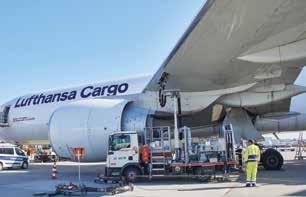
3 minute read
COMMENT
Moving the Freight Goalposts
From Where I’m Sitting – Howard Knott – howard@fleet.ie
I suppose that I shouldn’t have been surprised to see several news outlets using the excuse of the announcement of Eamonn O’Reilly’s decision to step down from the role as Dublin Port Company CEO in August this year to raise once again the tired issue of taking all those pesky ships out of Dublin and replace them with a developer driven residential setting. If it’s so easy to build a replacement port somewhere else along the east coast and to house thousands on the existing Port Estate, then perhaps a simpler idea would be to leave the port where it is and to develop all that housing at the alternative location? After all, in a post-COVID world in which working from home, entertainment via netflix, and shopping on-line could become the new normal, perhaps the concept of housing near a city is outdated? Perhaps the development focus for the Dublin region should be increased port and airport efficiency, more distribution centres, and further development of the road and rail network to feed cargo and people to and from the rest of the country?
Is this all nonsense? Probably!
There are two issues, however. First, the development of Dublin Port under Eamonn O’Reilly’s stewardship over the last twelve years has been impressive. Even more so when you consider the bust to boom economy, Brexit, COVID and the development of clear objectives set out for the Port over the next twenty years. The second is that the ability of the Port to handle all that the shipping industry may throw at it will certainly be constrained, not that there will be any shortcomings in the provision of cargo handling facilities on the port estate, but by the fact that the geography of the Liffey Basin and Dublin Bay means that the provision of channels sufficiently deep that will allow large Container Ships, Ro-Ro vessels and Bulk Carriers to operate into and out of the port will become increasingly difficult.
So, does this mean that a deep spot should be chosen, and a new port built there? Well, here’s another ‘probably’. But, before millions of euros are spent on developing such a project, perhaps some thought should be given to the national picture.
Maybe the easiest way to get into this discussion is to focus on a specific issue. Every Beneficial Cargo Owner (BCO) in Ireland is only too aware of the huge delays involved in international shipping whether by sea or by air. While delays involving mega-containerships running into and out of Asia are out of the hands of the Carrier representatives in Europe, the shipment of containers between the European deep-sea ports and Ireland should be more manageable. But that’s not proving to be the case, and one reason for this is that the feeder container operators running services to and from Ireland simply cannot secure enough vessels with the 1,000 TEU capacity that works best for Irish traffic. In recent years very few such vessels have been built and most of the newbuilds are going to Asia, not only to feed more traffic to and from the mega-ports, but in some cases to run on behalf of freight forwarders from a smaller, less congested Asian port to a less congested European port.
The reason why the 1,000 TEU vessel and not the Scandinavian standard 2,500 TEU vessel is used for Ireland is simply that it would not fit into Dublin Port or be able to operate there. But, of course, such a vessel - similar in size to the Independent Vision, (pictured) could easily be handled now at Cork Port’s Ringaskiddy terminal and soon, at Foyne Port, Limerick. At Ringaskiddy containers could run to and from the Railhead at Marino Point, while the rail line to Foynes is already in line for development. If Ro-Ro ships continue to get larger and deeper, then Rosslare’s plan to have an eleven-metre depth at the quayside by 2024 might come into play.
Airfreight was mentioned. Even before COVID hit cargo volumes being carried on passenger aircraft were dropping, and cargo planes were becoming the new normal. Why not then, make Shannon the national freight airport and make full use of the already developed national road network to distribute from there.
Why not use what we have, or could have, for relatively little money?











